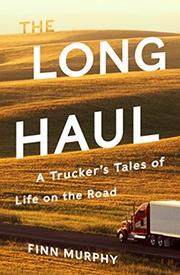
|
|
| photo: Kevin Snyder Photography | |
Finn Murphy is the author of The Long Haul: A Trucker's Tales of Life on the Road (Norton, June 6, 2017). More than 30 years ago, Murphy dropped out of college to become a long-haul trucker. Since then he's covered more than a million miles packing, loading and hauling people's belongings all over the United States. Known by his trucker handle as U-Turn, he spends his days (and many of his nights) in a 53-foot, 18-wheeler he calls Cassidy.
On your nightstand now:
Doktor Faustus by Thomas Mann is always there for its sheer intellectual power and breadth of subject. It's a book I can open to any page and get caught. It's an allegory about Germany's deal with the Devil. The Devil in the book is a very entertaining guy. I love it when he says: "It's not so easy to get into Hell."
Otherwise, I'm in a class/inequality vortex just now, so I also have Strangers in Their Own Land by Arlie Hochschild. I like this because a lefty goes to find the "deep story" of the righty. I think it's time for a righty to write a similar book about understanding lefties. President Obama said in his farewell speech for all of us to start listening to each other. Let's do that! I also have White Trash by Nancy Isenberg. I like this because it shows that manual labor has always been devalued in the United States. Top of the pile is A Legacy of Spies, John le Carré's new book. This is for pure fun. I flatter myself that I'm the world's foremost authority on le Carré.
Favorite book when you were a child:
Henri's Walk to Paris by Leonore Klein. Great illustrations by Saul Bass. Henri ends up where he started. Don't we all? Runner-up: My Side of the Mountain by Jean George. I wanted to run away and live in the woods, too.
Your top five authors:
George Orwell for his prescience; Barbara Tuchman for showing us that everything happens over and over again; Kurt Vonnegut for his cynicism; John McPhee because he can make watching paint dry a page-turner; Charles Mann for his perspective; and Stephen King for how everyday life can change on a dime. That's six.
Book you've faked reading:
Infinite Jest. I've tried it in book form and audio. Every sentence is brilliant, but I just don't like the guy.  Book you're an evangelist for:
Book you're an evangelist for:
1984. It perfectly describes not only how a police state works, but why oppression can be so attractive to certain individuals. Orwell is especially brilliant when it comes to how language can be used to restrict thought. In 1984, the Party destroys words, thereby eliminating the attached concepts while concurrently flipping the meanings of words to mean their opposites. Calling their Gestapo the Ministry of Love is particularly chilling.
Book you've bought for the cover:
The Fountainhead by Ayn Rand. Howard Roark just looked so heroic. Ayn sure knew how to make a hero. Too bad nobody's that perfect except that Howard liked his romps a little on the rough side.
Book you hid from your parents:
Tropic of Cancer by Henry Miller. I heard my parents talking about the decline of American letters and naming Miller as a perfect example. Naturally, I had to get it and skim for the juicy bits. Anything found in the house by Norman Mailer would suffer the same fate as my Woodstock record album: immediate defenestration. My seven brothers and sisters all had some fun winding up my father in this regard. I think he enjoyed it, too.
Book that changed your life:
Brave New World by Aldous Huxley. Rather than oppress people through a dearth of food and goods, let's lull them into conformity by giving them everything they want. Great idea! No need for the Stasi or NKVD anymore. Let's just have a drone deliver the Valium and cupcakes through Amazon. Same-day service, guaranteed.
Favorite line from a book:
"Behind every fanatic, there is doubt." --John le Carré.
Five books you'll never part with:
Rebecca by Daphne du Maurier. It's an unbeatable dark thriller with unforgettable characters. Mrs. Danvers scares me to death. It's also a great primer on how to NOT communicate with your spouse. Nobody's Fool by Richard Russo because it's just so darn funny. Tinker, Tailor, Soldier, Spy by John Le Carré because betrayal is a very complicated business. A River Runs Through It by Norman MacLean for its simple beauty of family and nature. The Contested Plains by Elliott West for his counterintuitive explanation of the collision between Native Americans and white gold-seekers in 1859.
Book you most want to read again for the first time:
The Lord of the Rings. Aragorn, the supposed hero, spends his time hanging around the Shire drinking in pubs, showing his broken sword to get free pints and boring the yokels with talk about the Dark Lord. It takes Frodo, who was mercilessly duped to take on the quest, to show him his destiny. As an aside, why didn't Tolkien save 2,000 pages of mayhem and simply have Gwaihir the Windlord Eagle drop the ring into Mount Doom after the Council of Elrond? It would have been no big deal. Gwaihir knew the way and eagles are immune to the ring's power.
Trends you've noticed in your own reading:
It's clear I have a thread of anti-totalitarianism in much of the above. What mystifies me is that apparently every generation needs to learn the lesson of freedom vs. control as if it never happened before. The risk is always the young being seduced by the promise of a future utopia. Democracy is messy. Anything by Arthur Koestler, Anna Seghers, Solzhenitsyn, Thomas Paine, Primo Levi, Solomon Northup will give some well-needed perspective about the efficacy of possible social panaceas and the motives of those who promulgate them. "Meet the new boss, same as the old boss."

